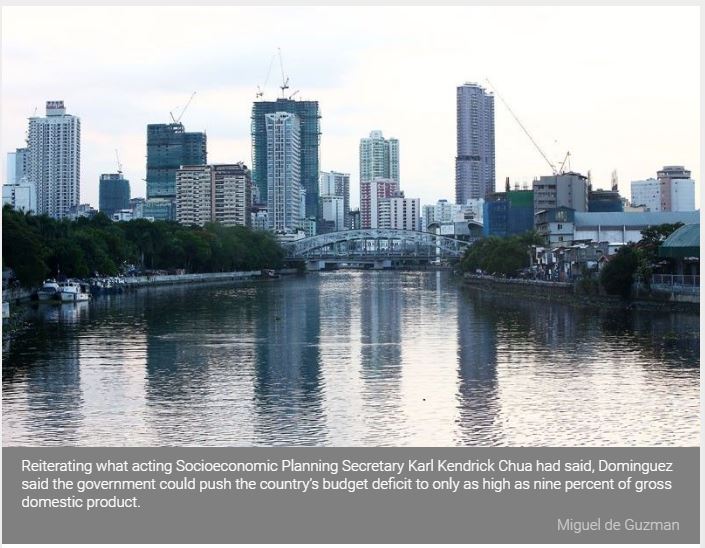Philippines: ‘Economic stimulus bills fiscally unsustainable’
MANILA, Philippines — The Department of Finance (DOF) hopes Congress will come up with a downscaled economic stimulus bill in response to the coronavirus pandemic, as it warned that the pending pieces of legislation are “fiscally unsustainable.”
“Multiple stimulus bills filed by the legislators from both Houses include a slew of additional provisions that make the proposals fiscally unsustainable,” Finance Secretary Carlos Dominguez said during the Sulong Pilipinas Forum yesterday.
Reiterating what acting Socioeconomic Planning Secretary Karl Kendrick Chua had said, Dominguez said the government could push the country’s budget deficit to only as high as nine percent of gross domestic product (GDP).
“It looks like our fiscal deficit is going to be around 8.1 percent of GDP. And we are willing to push it up to nine percent. So that is how much additional we can fund, between 8.1 percent and nine percent of GDP. And currently, that is more or less P170 billion to P180 billion,” Dominguez said.
As such, the finance chief said the government cannot afford to implement a P1.3 trillion fiscal stimulus program, as proposed by lawmakers under the Accelerated Recovery and Investments Stimulus for the Economy (ARISE) bill.
Furthermore, Dominguez clarified that there are constitutional constraints that limit the government from passing a larger economic stimulus program.
“The Constitution says we cannot have a supplemental budget that is not supported by additional revenues or savings. Right now we have no savings, because we have used them all up. And we have no additional sources of revenues on the horizon,” he said.
“People are saying, well you just borrow money. But you know loans do not qualify as additional revenues or savings. So we cannot use borrowing as support for that,” he added.
According to the finance chief, the DOF has already informed lawmakers of the fiscal implications of the proposed stimulus packages in Congress.
He said the Senate has responded and downscaled its proposed standby fund under the Bayanihan to Recover As One bill to P140 billion.
“But their proposal is so far from the House proposal. The House bill is P1.3 trillion and the Senate bill is P140 billion. So that is like a little over 10 percent only of what the House bill is,” Dominguez said.
“We have to have some kind of reconciliation of the bills before we can really move forward,” he said.
Dominguez also presented key recommendations that would make the proposed bills more fiscally viable.
For one, he said decisions for the provision of credit should be determined and managed solely by government financial institutions which possess the expertise on such functions.
“Cash-for-work programs are best redirected toward pressing needs related to managing the pandemic, such as hiring of contact tracers,” he added.
Finally, he said beneficiaries of wage subsidies should be from areas that remain under enhanced community quarantine, with the distribution of grants done via digital payout technologies.
Asked if he would urge the President to veto the proposed stimulus package should a fiscally unsustainable version be passed, Dominguez said it is a political matter.
“That is a political question. I mean, how will it look to the ordinary people, when you’re saying, oh, we promise you so much, knowing that is not fiscally sustainable. I mean, is that the responsible political message you’re sending? I’m not sure,” he said.
Meanwhile, Dominguez said the DOF will push for the retroactive implementation of the Corporate Recovery and Tax Incentives for Enterprises (CREATE) Act should it be passed by Congress past July 2020.
“Yes, because that is what we calculated,” he said.
“The CREATE bill is P43 billion. And if we are able to get a piece of legislation close to what the Senate wants, which is P140 billion, we can afford both,” he added.
Source: https://www.philstar.com/business/2020/06/09/2019531/economic-stimulus-bills-fiscally-unsustainable


 English
English




